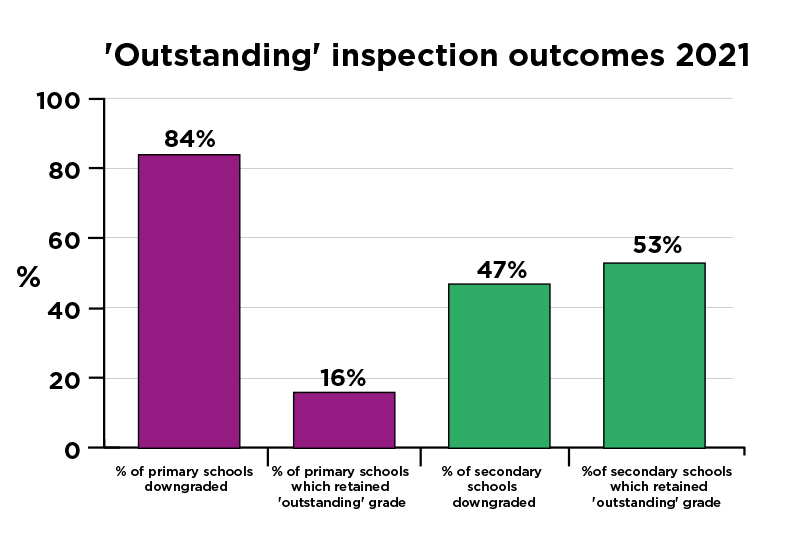Smaller staff numbers in primary schools and limited access to subject specialists creates disadvantages under Ofsted’s curriculum-heavy inspection framework, leaders have warned.
It comes after new analysis suggests primaries are far more likely to be stripped of an ‘outstanding’ grade, although researchers caution that it is still early days.
Downgraded schools call the inspection experience “demoralising”, while unions say a “lack of understanding” from the watchdog leads to suspicions that primaries are dealt with “particularly harshly”.
But Ofsted says its framework “is not disproportionately tougher” for primaries with inspectors taking a school’s size and phase into account.
84 per cent of ‘outstanding’ primaries downgraded
FFT Education Datalab analysis of Ofsted’s monthly management information found that 57 of the 68 ‘outstanding’ primary schools (84 per cent) inspected during the autumn 2021 term were downgraded.
In contrast, 47 per cent of ‘outstanding’ secondary schools were downgraded in the same period. However, inspectors visited only 15 such schools.
Ofsted’s inspection framework places more emphasis on a well-planned curriculum than results, once given more prominence.
Kinoulton Primary School in Nottingham was downgraded to ‘good’ following an inspection in September.

The watchdog noted the school’s curriculum was “not yet sufficiently well planned and sequenced in some subjects”.
Simon Paramore, the school’s head, said the inspection fell just three weeks after the school began implementing a new curriculum.
“We’re a very small school, we’ve only got five classes, so for us to get every single subject to the standard is incredibly tough because we just haven’t got the manpower of a big secondary.”
Primary schools often had one staff member co-ordinating four subjects, while secondary schools might have four staff members per subject, he said.
Lack of subject specialists
Jessica Mair, the head of John Betts Primary School in west London – which was downgraded following a November inspection – admitted the school knew it was likely to lose the top grade because of the demands of the new framework.
“We’re never going to be as specialised as a secondary,” she said. Most of her staff lead two subjects each.
Primaries and secondaries needed separate frameworks to take account of the differences, she said.
“Having gone through it, it’s quite demoralising.”
Peter Cansell, of the National Association of Primary Education, suggested a “lack of understanding” in Ofsted that the distinct subject boundaries in a secondary school were not applicable to the integrated curriculum of many primary schools.
Julie McCulloch, the director of policy at the Association of Schools and College Leaders, said; “The suspicion lingers that primaries are dealt with particularly harshly.”
But Ofsted said that “transitional arrangements” – which will run until at least March – allow it to “recognise that not all schools, particularly smaller primaries, will have had the opportunity to complete the process of constructing their curriculum fully”.
Covid impact on primary ‘not recognised’ by Ofsted
Cansell said inspectors had shown “significant disregard “ for the impact of Covid in primary schools. This was less of a problem at secondary level where pupils have “already developed the patterns of learning needed”.
Headteachers have long said that Ofsted has not considered the toll of Covid on schools, with Mair believing her school’s efforts were not acknowledged.

However Ofsted has said this is not the case and that it does “recognise the huge efforts” of schools.
FFT analysis revealed that 77 per cent of ‘outstanding’ schools inspected in 2021 were downgraded. Top-rated schools were exempt from inspection for more than a decade until routine re-inspection began in September.
Amanda Spielman, the chief inspector, has said it was “more realistic” to halve the number of ‘outstanding’ schools.
Chris Russell, the watchdog’s national director of education, admitted last year that some ‘outstanding’ schools that have improved since their previous inspection may still be downgraded because the bar has been raised.
Paramore agreed: “It’s not that the school has got worse – it’s just the goalposts have moved so much.”
















Your thoughts